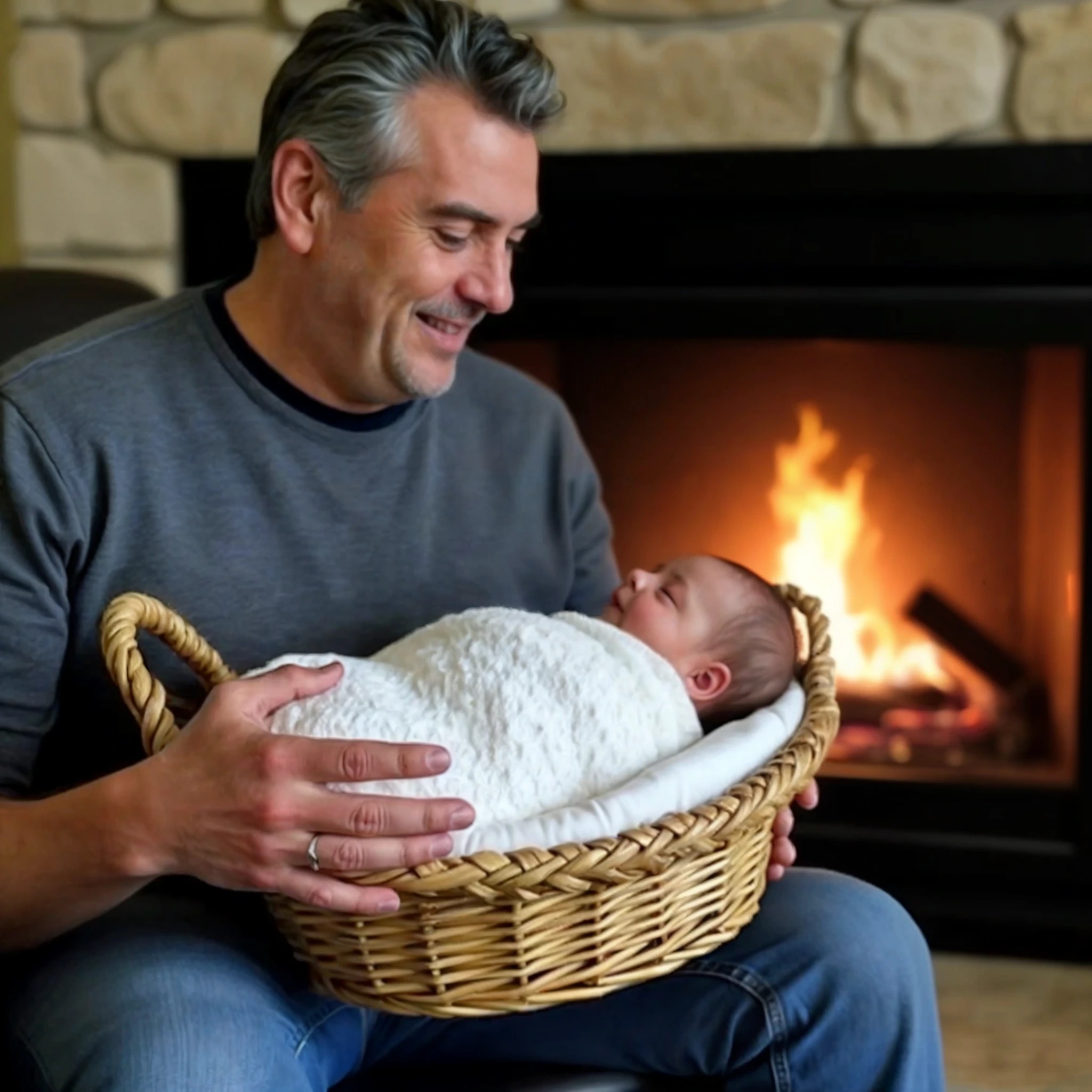Leonid had grown accustomed to solitude over the years. At 54, his life was simple and quiet—an existence marked by the echoes of memories from a past that seemed too distant to touch anymore. He lived alone in a small house on the outskirts of the village, where the hum of everyday life rarely interrupted the stillness of his days. The death of his wife years ago left a gaping hole in his heart, and though he tried to fill the void with work and routine, nothing ever quite replaced the companionship he had once known.
One frigid winter night, as Leonid sat by the warmth of the fireplace, the familiar crackling of the flames filling the room, a strange sound caught his attention. It was faint at first, but persistent—a soft rustling, almost like the sound of someone crying. He paused, his senses alert, listening closely.
The cry came again, louder this time, and Leonid’s heart skipped a beat. He rose from his chair, his feet cold against the wooden floor, and walked cautiously to the door. The air outside was sharp, the wind biting at his skin. He opened the door slowly, scanning the area for any sign of the source.
There, at his doorstep, was a basket. The sight stopped him in his tracks. Inside, wrapped snugly in warm blankets, was a tiny baby—crying relentlessly, its little face red from the cold.
Leonid’s heart raced. His first instinct was to look around, to see if anyone was nearby, but the street was empty. The cold wind howled, but there was no sign of anyone who might have left the child.
He stood there for a moment, frozen in disbelief. Who would leave a baby here? Why? But as his gaze fell on the helpless little one, a wave of compassion washed over him. Without thinking, he bent down, scooped the baby into his arms, and brought it inside.
The warmth of the house seemed to comfort the child, and the crying soon faded. Leonid, still in shock, settled in front of the fire, cradling the baby against his chest. In that moment, his heart softened, and he felt an unexpected rush of love for the small life he now held in his arms.
He named the child Matvey, a name that seemed to suit the boy’s delicate features. The years passed, and Leonid raised Matvey as his own, watching him grow from a helpless infant into a curious, bright young boy. The house, which had once been eerily silent, now echoed with the sounds of laughter and play. For the first time in years, Leonid felt a true sense of happiness, the kind that comes with family, even if it was a family he had never expected.
But as the years passed, a lingering fear crept into Leonid’s heart. He had never asked where Matvey had come from, never questioned the circumstances of his arrival. All he knew was that the child had become the center of his world. The thought that their peaceful life could be disturbed, that someone might come to take Matvey away, was a fear that Leonid couldn’t shake.
Then, one day, when Matvey was 17, his worst fear came true.
It was a bright, crisp afternoon when a luxurious red car pulled up to the front of their modest home. Leonid, who had been working in the garden, paused. The sleek vehicle, so out of place in their simple neighborhood, made his heart skip a beat. A man in an elegant suit stepped out, his posture confident, almost commanding.
Leonid’s instincts went on high alert. He wiped his hands on his shirt and walked toward the front door. As the man approached, Leonid’s unease grew, his pulse quickening.
The stranger stopped at the door and fixed Leonid with a steady gaze. His expression was unreadable, his features sharp and impassive.
“My name is Yevgeny,” the man said, his voice smooth, almost detached. “I’ve come for Matvey.”
Leonid’s breath caught in his throat. He stood frozen in the doorway, unable to process the words.
“Who are you, exactly?” Leonid demanded, his voice shaking with a mixture of confusion and fear. He had no idea who this man was or what he wanted, but the calm way he spoke, as if he had every right to make such a claim, sent a chill through Leonid’s spine.
Yevgeny remained silent for a moment, his eyes never leaving Leonid’s. The weight of the moment hung in the air, thick with tension. Leonid’s mind raced as the reality of the situation began to settle in. Whoever this man was, whatever his connection to Matvey was, Leonid had no intention of letting go of the child he had raised as his own.
“I… I don’t understand,” Leonid stammered. “He’s my son. I’ve raised him.”
Yevgeny’s eyes softened for a brief second, but his voice remained steady. “He’s not yours, Leonid. He belongs to someone else.”
The words hung in the air, heavy and final. Leonid’s heart sank.
